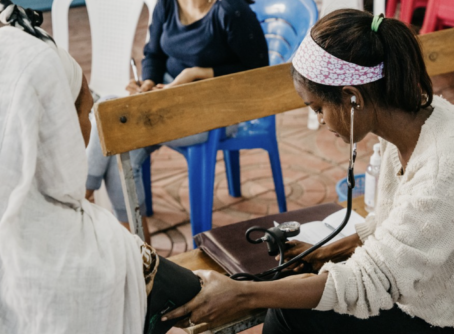
Debt can be dangerous, especially for young adults. How many of us young adults, not experienced in the world of borrowing, have missed a credit card bill and ended up with unmanageable payments? How many of us, without a robust credit history, have been forced to accept high interest rates on the loans we apply for? Who else — living paycheck to paycheck as we build up savings — has scrambled to find a way to pay for an unexpected medical bill or car repair? We graduate college and face years of debt for our education. All the while, we are haunted by the reminders that our financial decisions now can affect us for the rest of our lives.
It’s far too easy for young adults to end up at the mercy of predatory lenders. With Consumer Financial Protection Bureau protections threatened, the danger of payday lending could soon get even worse. In October 2022, the Fifth Circuit of the U.S. Court of Appeals declared the funding structure of the Consumer Financial Protection Bureau (CFPB) unconstitutional. The Supreme Court will hear the case against the CFPB’s funding structure later this year. If the Supreme Court rules in agreement with the Fifth Circuit, the CFPB could be stripped of its power to combat predatory lending, leaving consumers like young adults more vulnerable to unfair financial practices. As a matter of loving our neighbors, faith communities should speak out as advocates for curbing youth debt.
The Youth Debt Crisis
Predatory lenders look for potential borrowers who have a high chance of defaulting on payments, and young adults can be easy targets. According to a 2023 brief from The Urban Institute, “1 in 5 young people have unpaid debt that was sent to a third party for collection.” Furthermore, it’s difficult to both pay off debt and meet present financial obligations with a limited income, forcing young adults to borrow even more through loans or credit cards. This can quickly cement a cycle of debt that’s difficult to get out of.
It is also worrying to look at disparities when it comes to youth debt. In communities of color, 25% of youth have debt in collections, as opposed to 17% of youth in majority white communities. There are regional disparities as well. Southern states have the highest rates of young adults with debt in collections and credit card or loan delinquency. In West Virginia, South Carolina, Oklahoma and Arkansas, approximately 30% of young adults have debt in collections.
The CFPB is an important advocate when it comes to protecting young adults from payday lending. This agency, as part of its responsibility to protect consumers, works to stop predatory lending and equip young people to build brighter financial futures. The CFPB has implemented many consumer protections against predatory lending practices that target vulnerable borrowers like young adults. The CFPB has also provided financial education resources to help young people avoid predatory financial situations.
But depending on how the Supreme Court rules later this year, the past twelve years of the CFPB’s regulatory policy may be threatened.
Faith and financial regulation
The path to human and community flourishing is hindered by exploitative financial practices. Predatory lending in particular financially harms borrowers through manipulative, aggressive tactics that are unfair and unjust — both qualities that God hates. Scripture reveals God to be a champion for financial justice and calls us as his people to be the same. Proverbs 11:1 says, “A false balance is an abomination to the Lord.” Deuteronomy 16:19-20 says, “Do not pervert justice or show partiality […] Follow justice and justice alone, so that you may live and possess the land the Lord your God is giving you.” Proverbs 22:22 goes further: “Do not exploit the poor because they are poor and do not crush the needy in court.” Our faith in God should motivate us to speak out against institutions that perpetuate unjust financial practices, trap individuals in poverty and vulnerability, and create systemic imbalances in financial power.
The financial foundations that young adults build set a trajectory for the rest of their lives. When unjust lending practices initiate cycles of debt for young adults, that debt can have long-lasting effects. It can affect their ability to buy a home and choose where they raise their family. It can affect their quality of life by making it difficult to go to college, pay for health insurance or make financial investments in a retirement plan. These effects can erode financial stability over a lifetime, having serious effects on individuals, families and communities. Because the question of consumer protections has big implications for young adults and their futures, it’s important to understand the case brought against the CFPB and the roles of government, business, and society in relation to it. Why is the CFPB under attack in the first place?
The Case
The CFPB, set up by the Dodd-Frank Act of 2010, receives its funding directly through the Federal Reserve, rather than through congressional appropriations like most government entities. This funding structure was intended to protect the CFPB’s regulatory responsibilities from political agendas and pressures, but critics argue that it allows the agency to avoid accountability. Those critics include payday lenders, which are institutions that often take advantage of borrowers by targeting vulnerable populations and charging interest rates as high as 780% APR or more.
Two groups representing payday lenders brought the recent case against the CFPB because the agency has cracked down on predatory payday lending practices. The Fifth Circuit ruled in favor of the lending interest groups in a move that could significantly reduce the CFPB’s authority to protect consumers. The court’s reasoning was that “Congress’s decision to abdicate its appropriations power under the Constitution, i.e., to cede its power of the purse to the Bureau, violates the Constitution’s structural separation of powers.” The Fifth Circuit’s ruling also voided a 2017 CFPB rule on payday lending, potentially endangering all of the CFPB’s regulatory and enforcement actions since its creation in 2011.
The decision about the CFPB’s fate will stay undecided at least until the Supreme Court reconvenes in October 2023. Depending on how the court rules, other government entities might also be implicated. The Federal Deposit Insurance Corporation (FDIC), which has a similar funding structure to the CFPB, noted that its rulemaking authority might come in the crosshairs of the Fifth Circuit’s ruling. Other agencies funded outside of congressional appropriations, and thus potentially at risk in this ruling, include the Federal Reserve and Office of Comptroller of the Currency. If the Supreme Court agrees with the reasoning of the Fifth Circuit regarding the CFPB’s funding, the Court could be “stepping on a landmine by going this route.” Not only would it increase the compliance burden on businesses by invalidating over a decade of regulatory policy, it could set a direction for increasingly limited government regulatory authority — opening the door to more abuses of power. Given the wide-ranging issues at stake, how should the court respond?
A Public Justice Perspective on Financial Regulation
I advocate a public justice response to the CFPB case. Public justice is a faith-based framework for public life that reflects God’s vision for integrated and just civic life. This framework asserts that society “can flourish only when governed by standards that transcend interest-group competition.” In the case of the CFPB’s legal battle, consider that the CFPB was set up to protect consumers from unfair treatment by financial institutions, and its independent funding structure is actually meant to prevent abuses of power by Congress. Furthermore, predatory lenders exert powerful influence on political processes when they make significant campaign contributions. If the CFPB under a revised structure is overseen by these politicians, there are financial incentives for legislators to reduce the CFPB’s regulatory authority so their political funders can make bigger profits on exploitative practices. Keeping the CFPB independent of partisan, congressional influence is a way to promote the flourishing of all groups in society and protect the financial health of young adults.
However, giving the government blanket power for regulation isn’t the singular answer to predatory financial practices. The public justice framework states that “The authority of government is not limitless. Governments may not ignore or displace other kinds of human responsibility in other institutions.” This is true when it comes to the financial industry. The American government should have limited interaction with financial institutions because society benefits from market competition and incentivization. Financial institutions have a responsibility to carry out lending and borrowing with integrity and excellence — to conduct their business for the benefit of themselves and the stakeholders they serve. There must be space in society for these institutions to respond to market fluctuations and consumer demand in ways that the government cannot. However, when financial institutions, specifically payday lenders, choose to charge exorbitant, poverty-cycle-exacerbating rates, the government has a responsibility to step in and provide regulation. The CFPB’s role should not be to stifle financial institutions, but to carefully consider the good of business and consumers so that the two remain in balance. Thus, the CFPB cannot operate without oversight or accountability on its power, just as financial institutions cannot.
This is also not an argument for government and business to dismiss the role of consumers, who hold their own responsibility to invest, borrow and spend wisely. Proverbs 22:7 is a warning to both lenders and borrowers: “The rich rule over the poor, and the borrower is slave to the lender.” Young consumers should use the power and wisdom at their disposal to make sound financial decisions.
What’s next
Lawmakers are responsible for taking action against predatory lenders and ensuring that young adults are protected from predatory lending practices. State, city, and county legislators don’t have to wait for federal action to set small loan usury caps in their locality to prevent payday lenders from charging unfair interest rates. Federal legislators can continue to implement policies against payday lending through congressional action. The SAFE Lending Act of 2022 is a recent example of how lawmakers can take action against predatory lending and solidify protections for consumers. Politicians should also stop accepting campaign donations from payday lenders. A leading example of this is Sen. Sherrod Brown of Ohio, who is a vocal advocate for government regulation of payday lenders. More lawmakers should make a commitment to supporting fair lending by avoiding payday lending’s campaign finance influence.
Faith leaders and communities must also step into these issues of financial regulation and the youth debt crisis. While it is the responsibility of the government to confront unjust systems of lending, churches can advocate for justice by supporting proper regulatory action by the government. There are other ways that churches can get involved in curbing youth debt and taking direct action in their communities. Local congregations can collectively provide financial assistance to young adults when emergency expenses arise and remove the need for payday loans. By creating networks of community support, churches can offer mentorship and resources to young adults learning to steward their finances. Faith communities can also connect young adults to employment and educational opportunities that contribute to financial stability.
This is an issue that affects not just public servants and bankers, but also young Americans and our communities. Predatory lending can create dangerous cycles of debt — and for one in five young adults, it already has. To change the trajectory of this youth debt crisis, we should advocate for proper responsibility and accountability between government, the financial industry and consumers.
Madeline Pannell is the Shared Justice Fellow at the Center for Public Justice. She is part of the Capital Fellows Program in McLean, VA, and recently graduated from the University of Virginia with a B.A. in East Asian Studies. Prior to her work at CPJ, she worked for the Center for Digital Editing at UVa, developing innovative digital-historical projects.





